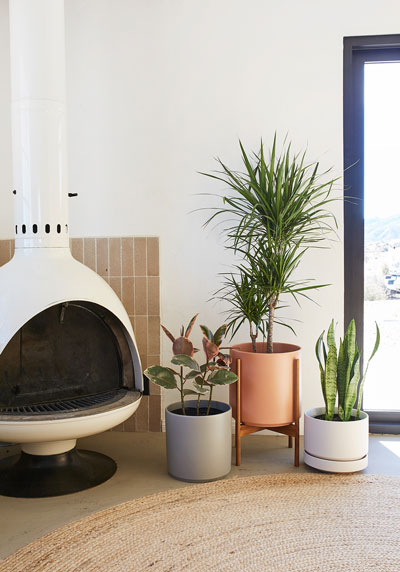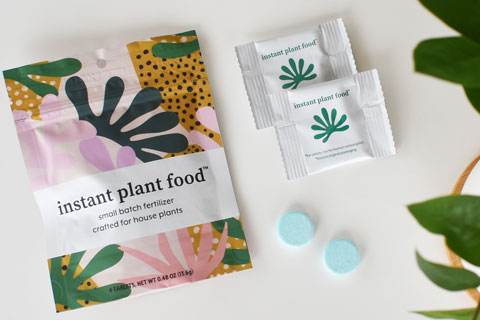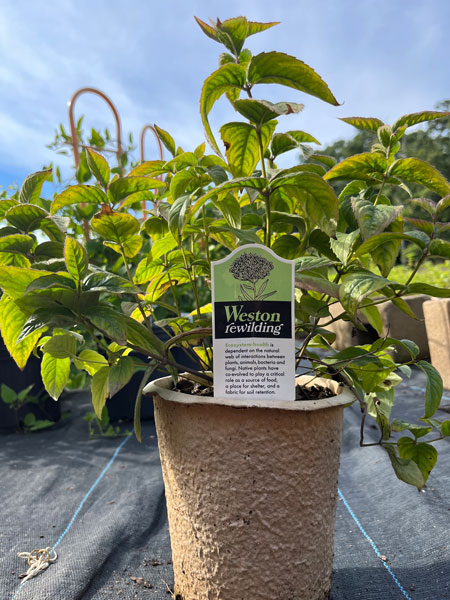10/1/2022
Eco Allies
Jennifer Duffield White

The surveys and the customers walking into your garden center are clear: they’re looking for more sustainable products and many of them are willing to pay more for such choices. But what do they want, exactly? And how can garden centers better work with their vendors and populate the shelves and benches with products that resonate?
Consider Intent
First, let’s recognize that consumers are looking for different versions of sustainability.
1. There’s the customer who wishes to make their own gardening more sustainable. They’re looking for solutions for their home environment—ways to use fewer pesticides, conserve water, improve wildlife habitat and/or decrease their own footprint. These products solve problems. But just as there’s no one formula to making your garden greener, there’s no single recipe for this kind of gardening.
2. Then there are the customers who want to purchase products from a company they regard as “sustainable” and ethical. (Yes, your garden center may count, but they’re also thinking about your suppliers.) The product itself may or may not have anything to do with sustainable gardening. They want to know the manufacturer is doing right—from the materials and packaging to their carbon footprint, how they treat their employees and their values. And it may be as simple as, “How did you grow this plant?”
Pictured: LBE Design uses all high-fire natural ceramic stoneware for their containers and either
sustainably sourced or reclaimed wood for their stands.
Jeff Robbins has spent much of the past few years talking with garden and plant shop retailers as he launched his effervescent fertilizer tablet. He says, “More now than ever before people want products that make things easier, so there is more time to do what matters most to them, and people want products that have a mission and make the world a better place.” He notes that he’s seeing more and more retailers looking for climate-friendly solutions in the products they source.
Veronica Denne of LBE Design, a company making high-end ceramic stoneware, says, “From our experience, the smaller boutiques and plant shops have consistently led the charge when it comes to conscientious sourcing. With the growing demand from customers for businesses to be transparent and sustainability to be a necessity rather than a bonus-feature, we’ve started to see stronger interest from large garden centers than we have in the past.”
Make it Purpose-Driven
Let’s start with products that make your customer a more sustainable gardener. Let’s acknowledge that some people love and use that “sustainable” term, and others don’t relate to it. They may be seeking more specific solutions: they want to help the bees, ensure everything is pet friendly, reduce their waste or keep the watering to a minimum.
 Pictured: Instant Plant Food uses third-party certification to ensure their sustainability messages are proven.
Pictured: Instant Plant Food uses third-party certification to ensure their sustainability messages are proven.
Water. With drought, water restrictions and expensive water bills plaguing many regions each year, irrigation and drought-tolerant solutions are a no brainer.
“We carry soaker hoses, moisture meters and water reservoir systems, as well as Hydretain, a soil additive and humectant that effectively cuts water consumption up to 50%,” says Peter Mezitt of Weston Nurseries in Massachusetts.
Also look to rain barrels, drought-resistant plants, mulches, irrigation timers and customer education. Bonus? Remind customers that most of these solutions can also save them time and labor (and money on that water bill).
Fertilizer. Here’s where you need to know your customers, your locale and the intent. Some customers may be worried about nutrient runoff into nearby waterways, while others want to ensure a product is safe around Fido. It could also be the content—is it petroleum-based or organic?
For Weston Nurseries, they tend to stock organic fertilizers, including Espoma, touting its safety around people and pets. They also produce their own compost, which is available to customers.
Instant Plant Food has moved the needle on providing fertilizer in a compact (fully recyclable) package by creating an effervescent tablet that dissolves in water.
We’ll let you handle the argument of which fertilizer is best, but suffice to say that your fertilizer options carry a lot of weight.
Pest & Weed Control. For some garden centers, it’s about having a broad range of choices in the pest control department. But more and more retailers are also feeling the pressure to be more selective. Broadway Terrace Nursery in Oakland, California, says they’ve eliminated all harmful pesticides and chemicals from their sales inventory.
That also translates to what was used on plants during production. At Squires Garden Centres in the UK, the chain says they’re looking to expand options for organic and chemical-free plants by 2024. And they’re phasing out sales of all products containing neonicotinoids and glyphosate during 2022.
 Pictured: Weston Nurseries now grows its own line of native plants called Weston Rewilding in eco-friendly pots.
Pictured: Weston Nurseries now grows its own line of native plants called Weston Rewilding in eco-friendly pots.
Plants. The reason your garden center exists: plants. And while plants provide their own excellent ecosystem services and are green in their own right, that’s no longer enough for many consumers, which is where the clamor for organic, sustainably grown, drought-resistant, locally grown and native plants comes in.
As retailers keep tabs on their customers, we see a few trends rising. Most significantly, native plants. Weston Nurseries went so far as to get back into the growing game in order to create and supply their own line of native plants, Weston Rewilding. Heeman’s in Canada says they brought on a new native seed supplier this year and are working with their wholesale growers to increase the production of native plants to meet demand.
Vendor Identity
For many garden centers, who they source from is as important as what they order.
“When it comes to hardgoods, we look for local vendors and unique products,” said Peter. “We don’t want anything Amazon carries.” Their rain barrels, for example, are locally made by New England Rain Barrels out of recycled plastic barrels.
Broadway Terrace Nursery believes in collaborative business practices and focusing on local art and small businesses. They get their pottery from local artists who focus on sustainability in production and delivery.
Sustainable Values
As consumers become more and more wary of greenwashing and more knowledgeable about sustainability, their expectations of companies have grown. It’s not enough that a product has eco packaging or recycled materials; they’re looking for the values of the company. How sustainable is the manufacturer—from how they treat their employees to the raw materials, shipping footprint, their energy usage and more?
Jeff says, “We are intrinsically motivated to create sustainable products because we want to leave the world a better place for future generations, and we feel that solving environmental problems not only protects our Mother Earth, but can help take the pressure off other challenges like social unrest and political division.”
But let’s be honest: In the world of branding and advertising, there’s a lot of greenwashing out there—products and companies making claims or insinuating a natural goodness that maybe isn’t quite accurate or outright false. And consumers are catching on. They’re a little more skeptical. They need convincing.
For Instant Plant Food, that means offsetting all their carbon emissions via a certification program called We Are Neutral, donating 1% of all sales to environmental causes that they verify through organizations like 1% for the Planet, and a Cruelty Free and Vegan certification.
Jeff says, “Third-party certifiers are needed in order to verify that what you say is in fact what you are doing. We are able to justify the costs of third-party certifications when our retailers put stickers and signage on or near our products to show that they are certified sustainable. Customers see this signage, resonate with these values and oftentimes are willing to spend a little extra to do their part in protecting our planet.”
Greg Niewold, owner of Power Planter, a gardening auger company located on a farm in rural Illinois, says, “There is a huge push for sustainability and customers appreciate as a manufacturer that we do what we can to be as sustainable as possible.”
That means sourcing everything from the U.S. and from as close to their location as possible—resulting in fewer trucks on the road and less emissions. Their on-site solar system allows them to run 100% on solar on sunny days, even selling electricity back to the grid. When it comes to packaging, they do their best to utilize recyclable lumber and paper products. Shrink wrap for weatherproofing is their only plastic usage.
At LBE Design, they’ve taken a conscientious approach to working with overseas manufacturing partners. Veronica says, “We take a 360-degrees approach to sustainability, both social and environmental. We carefully vet our partners and work closely with them to ensure that we are producing in the most sustainable way possible with little waste. We also believe people are the heart of every operation and we regularly audit all of our partners to ensure they pay a livable wage. and value work health and safety. In addition to these measures, we donate any ‘seconds’ from product batches that do not meet our strict quality control via our program, Plant-a-Seed. This way, we are able to partner with our shops to reach their communities and prevent any further waste from the production process.”
They use all high-fire natural ceramic stoneware for their containers and either sustainably sourced or reclaimed wood for their stands. Their plastic-free packaging is designed to minimize waste and even reduce the amount of recycling necessary for their customers.
Ask your suppliers the detailed questions behind the “we have sustainable values” claim. Know the story of the materials, the manufacturing process, shipping and beyond. It all matters. GP